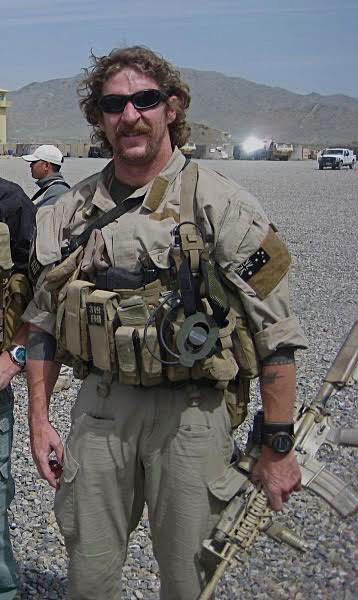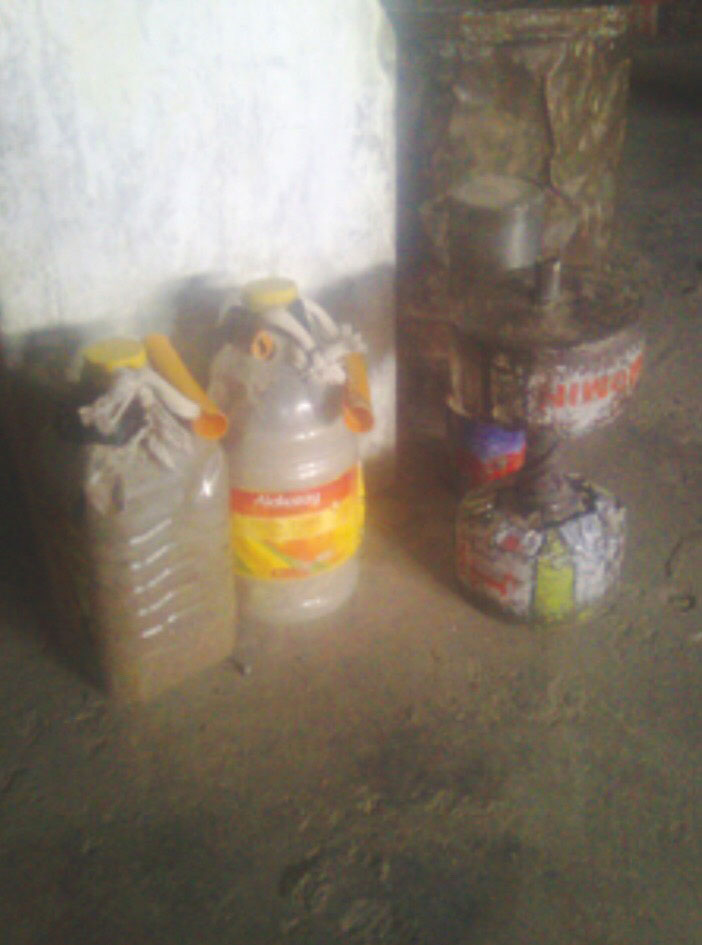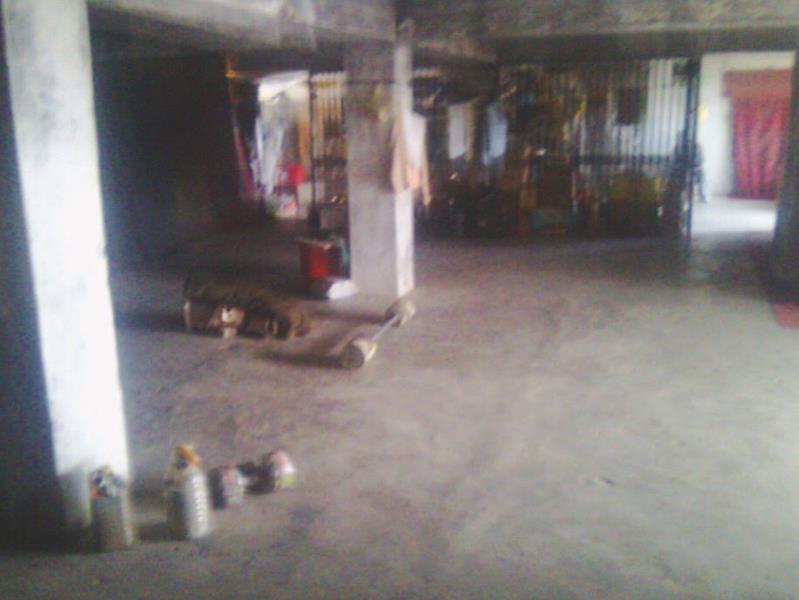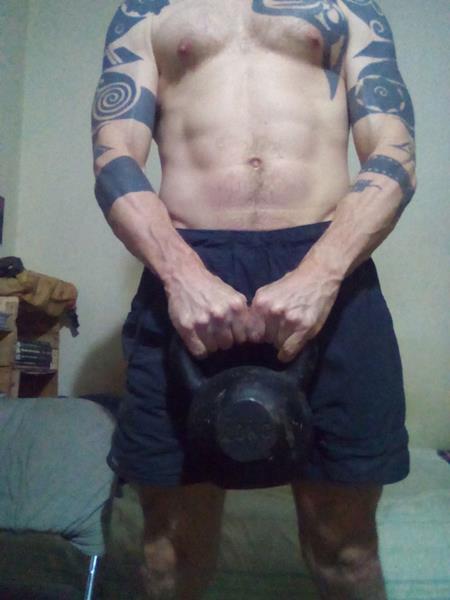Dragon Door: Before you were in the Army, did you have an athletic or sports background?
Rob Langdon: No, not at all. Where I grew up was essentially a cattle station in the middle of the desert in Australia. My family and a few other people used to work there during the 70s-80s, so for fun we rode horses, motorbikes, and I learned to drive and shoot guns. I used to walk everywhere and was a lot fitter than most people my age when I went to school. I never did any team sports, since I didn’t grow up with that, but I understood fitness—and improving the machine—in general.
 Dragon Door:
Dragon Door: When did you decide to join the Army?
Rob Langdon: My Mom's side of the family is all ex-military, she was Air Force and her Dad fought in World War II. Her sisters were also in the Navy. The military was always in the cards. When I finally went to school, it was in Woomera where the American Air Force had a large satellite tracking station in the middle of nowhere. I went from home school in the desert to an American High School in the 80s which was a bit crazy! I was also about two years younger than everybody else in my group since I was ahead of the game in my home schooling.
So, I was around military people and military families all the time, and it was the norm. I joined the Army as soon as I finished high school and began learning my trade in ’89. Then I went north to one of the light infantry battalions, and spent the next 10 years with them. I was an instructor at the School of Infantry after two years, then during my final years I was with the Brigade Reconnaissance Platoon which was a concept they were trying out. It was essentially like Pathfinders and we were a light infantry brigade based on a similar organizational scheme to a Marine Force Amphibious Unit. An analogy would be Force Recon back then, since we were sneaking around doing weird stuff, but we were not Special Forces—just Recon.
Dragon Door: During that time, what was your training like with those groups?
Rob Langdon: When CrossFit got started, it was never a surprise to us. It was essentially how our infantry guys had already been training. We did a lot of "let's get this and take it over that hill!" So we trained by doing bizarre things—almost punishing ourselves, but in the end we were extremely fit. A full range of motion was always a big thing in our training as well as work in the transverse plane. We had to be able to move and lift heavy weights, bodies, or whatever at weird angles. Most normal gym training just doesn’t prepare you for that.
Once I left the army and was working overseas as a contractor, there was a lot of money floating around in the early days and some locations had some big awesome gyms. That's when I first saw
kettlebells. One of the Canadian Special Forces guys who was working with us was heavily into kettlebells and that was the first I'd ever used them. He was doing CrossFit when I was first there. I followed along until it started turning into a competition and people were just smashing at it. I knew that all of the overheads and lunges for reps wouldn’t be good for the body—I didn’t want to break something. My sister and my girlfriend did it for a while and both ended up getting serious knee injuries. I’d already had a complete ACL reconstruction on one side, and had dislocated my other knee when I was in the army so I'm not the greatest when it comes to squats. I absolutely hate them, but they are necessary.
Dragon Door: So, what happened in Afghanistan?
Rob Langdon: I'd never done a contract quite like Afghanistan. It was a bit up in the air and a lot was happening at once. But I was in a position where I liked what I was doing. The owner of the company—who was ex-special forces—and one other guy who was my boss seemed to be the only ones who were really working on the business. I ran convoys for a week at a time with about thirty Afghan mercenaries. Depending on what the company wanted us to do, we would either avoid trouble …or cause it.
Most of the time I didn’t have access to a proper gym to train, but if we were near a special forces camp, I’d use theirs. But, in places like Kandahar, where most peoples’ experience in Afghanistan involves daily trips to Burger King, they freak out if a hairy, smelly, bearded person like myself cruises into the gym wearing afghan clothes and bringing weird rifles!
I tried to get some of my guys—the Afghans—to train and it was interesting to see what they did. A lot of it was Hindu wrestling style training, and some guys carried Indian clubs in their cars. I was once riding with an old guy who had fought the Russians in the 80s who only had one leg but was still strong as an ox and walking around.
The Afghans also have their own version of wrestling where they essentially try to lift each other up with a scarf or a belt around the waist. It’s also how things are sorted out in those places. The Pashtun guys who lived in middle of nowhere—where my guys originally came from—were big into it. I was surprised sometimes when we’d stop the convoy—some of them would pray and others would do sets of Hindi squats or push-ups.
I got in trouble much later on after all hell broke loose. I ended up having to kill one of the people who worked for the company after he pulled a weapon on me. The crew on that convoy were not my guys. I usually didn’t work with that crew because if they weren’t security, they would shoot at the convoys themselves! Then, they'd tell the Westerners that it wasn’t safe for us and that they’d take care of it—all the while they’d add extra trucks to the convoy carrying drugs, illegal weapons, or whatever. Then they’d be able to run the trucks all over the country with US backing because these were essentially military convoys.
The head of their crew was Panjshiri and was married to the sister of the Shah Massoud, the guy who was killed shortly before September 11th. The head of their crew had a lot of pull—along with typical warlord attitudes. The Panjshiri tribes are also mixed up with the secret police which is how they maintained control. It’s also how I ended up with three death sentences. Eventually the sentences were commuted to a 20 year prison sentence. That was when I started to realize that there was more to the story, especially when I was due in court and my appointed lawyer wouldn’t turn up, or the judge would tell him to shut up after five minutes.
So, I ended up in the infamous Pol-e-Charkhi prison. It’s hard to describe other than it’s a mix between Fight Club and the trash compactor in Star Wars most of the time. At first they put me with a group of foreigners, most of who were African drug smugglers. A few of them were professional smugglers who had been in jail in Pakistan and a few other places. They knew the game: a few guys would get caught for the rest of them to get through. But, I soon learned that the majority of them were just kids trying to pay off student loans, or guys trying to get money together to build a mosque, a school, or to start a business. It was interesting to talk to them—some were good, some were bad. Many Russians were also in jail, including an electrical engineer who had dual citizenship in Russia and Ukraine. One of the reasons he was in jail was because of his two passports. The Afghans thought he was a spy because of them. He had a stroke and died in jail a year before I got out.
Another Russian had been in the army. But, after he got his conscription and couldn’t find a job in St. Petersburg, he fell into drugs. One day he found a mosque and became a Muslim. When they noticed he had military experience, he was recruited into jihad. He’d spent a lot of time fighting and teaching in Pakistan. When he came back through Afghanistan, he was sold out by the people who had taken him in. He had been in jail for ten years, and was only in his thirties. While he was still a devout Muslim, all he wanted to do now was get out of jail and see his mother. He was also a very fit guy who was a kickboxer. He liked a lot of Western metal and punk music—and I still have a hard time getting my head around that—but it was sort of how we bonded. It was weird, but I learned a lot about the prison from him. Eventually they realized he only wanted to go home to Russia and would not come back, so they let him go.

Before he left, we managed to get some cement from a crew that was fixing the prison. We used it to make some dumbbells and weights. He starting talking about kettlebells, so we got a few big cooking oil bottles which let us vary the weights a bit—the handles would cut into you a bit, but it worked pretty well. We did have a few mishaps when handles would come off and an oil bottle full of concrete would go flying. When we were starting out, and when he was trying to get me to swing them properly, that's how we stumbled across some of your early
GiryaGirlTV videos on YouTube using the illegal phones we all had in the prison! So, I've known about
Dragon Door ever since.
After he was let out to go home to Russia, I lost my training partner. Then, most of the other foreign smugglers bought or bartered their way out. I was moved to a high security area with only Taliban, serious gangsters, and kidnappers. It was locked down but the commander in charge was a good guy, and I eventually became friends with him. Once he got to know me, he let me get another phone and some weights towards the end. But when I first arrived, it was locked down and the people weren't the nicest. I had some interesting run-ins in the exercise yard. We were let out for an hour a day and they let us take the weights we made, but we had to leave them out in the yard. After one Afghan tried to beat another to death, they took the weights away and I had to come up with another plan. Some of my mates who I had served with in the Army were working as contractors at the Australian Embassy. One of them was a bit of a fitness head, and sent me
Convict Conditioning which opened my eyes. When the
second and
third Convict books came out they sent those as well along with a few of
Al’s books—and I saw that you were in those! It was really weird! The books helped pass the time and I got really ripped even though I was eating next to nothing at the time.

When I left in 2016, I was pretty kitted out, I had another set of
kettlebells including a 20kg which was actually pretty good. I had a TV with 72 channels and the internet of course. I was left alone in my own space, and used to cook for myself because the food was pretty bad. The would give me rice, potatoes, eggs to cook, which I supplemented with stuff coming from outside and from the store in the prison. I cooked and trained religiously for a long time, but I wouldn’t train on Fridays (which was their holiday) out of respect for the other prisoners.

Training was my only outlet, and for a long time, I trained every day for two hours. The hardest part was finding something to hang off of, and it used to freak out the others when they saw me hanging off all the bars, doing l-sit pull-ups and flags!
Since I've been back in South Africa, I've sort of been dabbling here and there with training, but have started another cycle of kettlebells and
calisthenics. It keeps my head straight, and the repetition of
swinging kettlebells is one of the things that kind of stops the noise. I really dig it.
Dragon Door: It is really interesting, it seems like there’s a certain point in intense kettlebell workouts that can become almost meditative.
Rob Langdon: I don't know if it’s just endorphins, but it reminds me of how the Japanese talk about Zen and finding peace in the pursuit of an activity to the Nth degree. I've always sort of known that if you can train while your mind does what it needs to do in the background, it works a lot better—it shuts out the noise and you can hear the answers.
Dragon Door: Along with kettlebell swings, which other movements have you found to be standouts in your workouts?
Rob Langdon: I prefer doing overhead presses with kettlebells. Even though I had been putting up some serious weight last year with an Olympic bar for low reps, I like the variety of movements overhead with kettlebells. Even with
big kettlebells you might be moving less weight overall, but you’ll be working so much harder. It's just ridiculous just the way kettlebells train the entire posterior chain. When there’s no bar connecting the weights, you have to balance and line up both of them. Similarly, when people first see a proper bent press, they often say it looks like it would break their back. But with military, security, or bodyguard work, if you need to move someone's body or get them out of a car, you will be working in awkward positions.
Dragon Door: That makes a lot of sense. You have a book out now detailing your experiences, and which is a remarkably interesting read—admittedly, I read it twice. So, what’s next? What are you working on now?
Rob Langdon: I'm now trying my hand at a bit of fiction writing, but I'm a real stickler for detail so my writing also involves a lot of research. I’m also working with a group who I wrote training for years ago. Originally the training was for an agricultural college, but now we’re essentially building an app that can be used to train someone to do pretty much anything. It will be designed to help disadvantaged people in the townships and rural areas of South Africa. They will be able to learn job skills. This very needed since 25% of the population of South Africa is unemployed and 30-40% of the unemployed are under the age of 25—which has resulted in more crime. But we've come up with a pretty good model for the program, and I spent most of yesterday talking to community leaders in one of the townships. We’re speaking to leaders at libraries, churches, and mosques to get their communities involved in the program.
 Rob Langdon is the author of The Seventh Circle: A Former Australian Soldier’s Extraordinary Story of Surviving Seven Years in Afghanistan’s Most Notorious Prison Follow him on Instagram @roblangdon319
Rob Langdon is the author of The Seventh Circle: A Former Australian Soldier’s Extraordinary Story of Surviving Seven Years in Afghanistan’s Most Notorious Prison Follow him on Instagram @roblangdon319